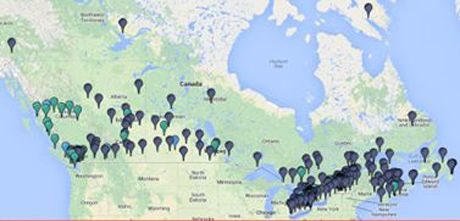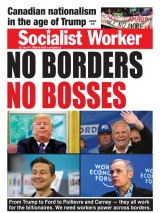News
You are here
More than a hundred communities rally to Defend Our Climate

November 22, 2013
Anti-pipeline rallies were held across the country last weekend, and the movement continues to gather support from diverse parts of the population. One hundred and thirty communities, large and small, in all regions, saw actions mainly initiated through the Defend our Climate organization. In several BC coastal communities, rallies took place on ocean shores (rather than more conventional, central squares) to emphasize the added danger of oil spills. In Toronto, the emphasis was on stopping Line 9.
The largest turnout was unsurprisingly in Vancouver, in a province that is facing direct attacks from the proposed Northern Gateway and Kinder Morgan pipelines, among others. The protest is a sign of increased divergence between the rulers and the ruled, as people fundamentally disagree with Premier Christy Clarke’s new-found faith in Alberta and Enbridge. The Liberals have been paying lip service to the majority opposition to Enbridge, and now that the election is over they are revealing their true colours.
Speakers at the Vancouver rally pointed out that there are 21 Tory MPs in BC, and if the Harper administration is foolhardy enough to allow the pipeline to be thrust through the province, those Tory MPs will be looking at new career options. Paradoxically, the civic authorities of Vancouver are completely behind the pipeline opposition—whether this is genuine concern on the part of the Vision party, or if it is the usual opportunist tactics to sway opinion is irrelevant. One governmental authority now sanctions the protest movement, and this reflects the power of the movement.
This is a coming together of different issues, which is part of the reason for the popularity of the anti-pipeline opposition. Besides the most obvious environmental concerns, there are issues of indigenous land rights, questions over the actual economic ripple effect that the pipeline would produce, and the continued debate regarding the time-limited oil industry.
Indigenous sovereignty and solidarity
But it is the First Nations that are leading the way, uniting broad swathes of the population in ways that no parliamentary organization could even dream of.
The mainstream media’s silence about the leadership role of First Nations is perhaps the most frustrating aspect of coverage of the events. While the majority of the speakers (to say nothing of the audience) at Saturday’s Vancouver rally were indigenous, CBC and other notable outlets simply concentrated on the environmentalists that took part in the protest. This is a dangerous development: as long as the media and conservative elements in power can shape this as another single-issue, environmentalist stunt, the movement will be cast aside and dismissed. It is up to all concerned parties within the movement to continue the momentum of shared interests. This is an umbrella movement that unites disparate groups, and this is an advantage that scares the dominant industries and authorities.
Taking on the combination of the grim specter of fracking, an oil industry that’s desperately clinging on to power, blatant disregard for indigenous rights, and the overwhelming arrogance of an administration beholden to the 1%, this mass movement has the potential to make history. Cohesiveness is key however, and there is no better time for a genuine united front.
Section:










